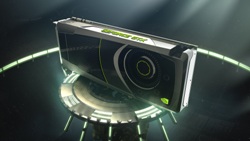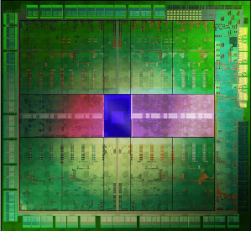
NVIDIA lancia le prime GPU basate sulla sua architettura grafica di prossima generazione Kepler, che assicura performance spettacolari ed eccezionali livelli di efficienza energetica.
Risultato di 1,8 milioni di ore di lavoro negli ultimi cinque anni, l’architettura Kepler introduce possibilità sul piano tecnologico senza precedenti sia per i gaming desktop che per gli Ultrabook.
Per i desktop destinati al gaming la GPU NVIDIA GeForce GTX 680 offre un’esperienza più ricca, all’insegna di una maggior velocità e silenziosità. Per quanto riguarda i notebook, la nuova lineup di GPU GeForce 600M porta le prestazioni degli Ultrabook a livelli davvero "ultra" e consente, mai come prima, la realizzazione di notebook più piccoli e più potenti. Entrambe le proposte sono immediatamente disponibili sul mercato.
"L’architettura Kepler rappresenta il più grande traguardo tecnologico conquistato da NVIDIA fino a oggi", ha dichiarato Brian Kelleher, senior vice president of GPU engineer di NVIDIA. "Porta con sé, infatti, grandi performance e un’eccezionale efficienza. I giocatori saranno entusiasti delle prestazioni della GTX 680, così come del fatto che non richiede rumorose ventole o alimentatori speciali. Anche gli utenti degli Ultrabook apprezzeranno la famiglia GT 600M per le sue prestazioni e l’efficienza energetica."
Kepler è basata su tecnologia a 28-nanometri e succede all’architettura Fermi a 40nm, che era stata inizialmente introdotta nel Marzo del 2010.
GeForce GTX 680: matrimonio tra velocità e efficienza energetica estrema
La GeForce GTX 680 porta performance sorprendenti e un’eccezionale efficienza energetica al mercato dei desktop per il gaming, assicurando velocità e un’esperienza d’uso piacevole e con i più elevati livelli di silenziosità.
Paragonato al prodotto concorrente più vicino, la GeForce GTX 680 è più veloce del 300% nelle performance di tessellation con le DirectX 111 e fino al 43% più veloce con i giochi più avanzati, come, ad esempio, Elder Scrolls V: Skyrim2, il tutto con consumi inferiori del 28%3. La GTX 680, inoltre, assicura prestazioni per watt doppie rispetto alla GeForce GTX580, il processor flagship basato su Fermi cui Kepler va a sostituirsi.
Ponendosi come standard per le GPU future del segmento enthusiast, la GTX 680 è equipaggiata con una serie di nuove tecnologie, che comprendono:
- Un nuovo streaming multiprocessor block, noto come SMX, che offre il doppio delle performance per watt dei prodotti di precedente generazione
- Componenti speciali, tra cui acoustic dampener, heat pipe ad alta efficienza e alette personalizzate, per offrire un’esperienza di gioco "silenziosa"
- Tecnologia NVIDIA GPU Boost, che aggiusta dinamicamente le velocità della GPU per ottimizzare le performance di gioco
- Nuove tecnologie, come antialiasing FXAA e TXAA e Adaptive Vsync per arricchire la qualità delle immagini senza compromettere le prestazioni di gioco
- Supporto di più display, fino a quattro complessivamente, di cui tre in 3D con una card singola per un’esperienza con giochi 3D particolarmente immersiva
- Un nuovo processo produttivo a 28-nm di TSMC, con supporto a PCI-E Gen 3 e DX11.1
"Un’esperienza veloce, fluida e ricca; la scheda GeForce GTX680 è davvero un’innovazione che cambia le regole del gioco", ha detto Sebastian Concato, R&D manager di Next, che ha proseguito: "Se NVIDIA mi avesse detto prima che questa scheda ha una tale potenza con soli due connettori da 6 pin, non le avrei creduto. Next ha creato un PC incredibile, che qualsiasi appassionato di gioco sarebbe orgoglioso di possedere".
Mark Rein, vice president di Epic Games, creatore dell’Unreal Engine e del famoso "Gears of War", ha commentato: "La GTX 680 è sorprendente e ridefinisce completamente il concetto di cosa sia una GPU per il segmento enthusiast. Abbiamo già assistito a un ottimo riscontro per la GTX 680 alla recente dimostrazione in real time ad alcuni sviluppatori selezionati di Samaritan insieme a un’anteprima speciale di Unreal Engine 4."
Famiglia di GPU GeForce 600M: Introdurre l’ "Ultra" negli Ultrabook
La serie di GPU NVIDIA GeForce 600M, se accoppiata con la tecnologia dei più recenti processori Intel, consente di realizzare notebook sottili, leggeri e veloci.
Gli avanzamenti tecnologici che gli consentono di distinguersi sul mercato sono:
- Tecnologia NVIDIA Optimus, che assicura una durata extra-lunga della batteria scegliendo in automatico di attivare la GPU solo quando serve
- Driver NVIDIA Verde per notebook, che spesso garantisce un significativo incremento delle prestazioni e della stabilità
- Supporto a NVIDIA PhysX engine, che migliora il realismo dei giochi
- Tecnologia NVIDIA 3D Vision (opzionale), che converte automaticamente oltre 650 titoli in un 3D immersivo
- NVIDIA 3DTV Play (opzionale), un software che porta la 3D Vision-based dei notebook sulle TV 3D
- Tecnologia NVIDIA SLI, che sfrutta due GPU NVIDIA GTX per raddoppiare le performance di gioco
"Acer Aspire Timeline Ultra M3 porta a un livello superiore di performance la categoria degli Ultrabook.", ha affermato Sumit Agnihotry, vice president of product marketing di Acer America. "Con le GPU GeForce a bordo, i nostri Ultrabook thin & light fanno tutto ciò che i clienti desiderano, senza compromessi."
Rene Haas, general manager dei prodotti notebook di NVIDIA, ha commentato "I clienti vedranno a breve i produttori di notebook lanciare diversi Ultrabook che si meritano davvero l’appellativo di "ultra". La più potente ed efficiente GPU GeForce 600M aumenterà le performance dell’attuale segmento Ultrabook fino a quello dei notebook gaming e sarà la GPU discreta più utilizzata con i prossimi processori Ivy Bridge."
Disponibilità
La GPU NVIDIA GeForce GTX 680 GPU è disponibile da oggi presso i principali fornitori di schede grafiche discrete al mondo, tra cui ASUS, EVGA, Gainward, KFA2 (Galaxy), Gigabyte, Inno3D, MSI, Palit, Point of View, PNY, Sparkle e Zotac.
Il prodotto è immediatamente disponibile anche presso i principali e-tailer italiani con prezzo al pubblico raccomandato a partire da 419 Euro + IVA .
I produttori di notebook che hanno deciso di adottare la serie di GPU GeForce 600M GPU per i propri notebook o Ultrabook al momento sono: Acer, Asus, Dell, HP, Lenovo, LG, Samsung, Sony e Toshiba.
Maggiori informazioni sulla nuova GeForce GTX 680 e sulla serie mobile 600M sono disponibili sul sito www.geforce.co.uk , mentre per video, immagini e altro materiale su NVIDIA è possibile visitare la newsroom NVIDIA.

[Immagine ad alta risoluzione]

[Immagine ad alta risoluzione]

[Immagine ad alta risoluzione]

NVIDIA launched the first GPUs based on its next-generation Kepler graphics architecture, which deliver dramatic gaming performance and exceptional levels of power efficiency.
The result of some 1.8 million man-hours of work over five years, the Kepler architecture's first offerings bring unprecedented technical capabilities to both gaming desktops and Ultrabooks.
For desktop gaming, the NVIDIA GeForce GTX 680 GPU provides a faster, smoother and richer experience. For notebooks, the new lineup of GeForce 600M GPUs puts the "ultra" in Ultrabooks, enabling smaller, more powerful designs than were previously possible. Both are available immediately.
"The Kepler architecture stands as NVIDIA's greatest technical achievement to date," said Brian Kelleher, senior vice president of GPU engineering at NVIDIA. "It brings enormous performance and exceptional efficiency. Gamers will love the GTX 680's performance, as well as the fact that it doesn't require loud fans or exotic power supplies. Ultrabook users will love the GT 600M family for its performance and power efficiency."
Kepler is based on 28-nanometer (nm) process technology and succeeds the 40-nm NVIDIA Fermi architecture, which was first introduced into the market in March 2010.
GeForce GTX 680: A Marriage of Speed and Extreme Efficiency
The GeForce GTX 680 GPU brings impressive performance and extreme efficiency to the desktop gaming market, delivering a quiet, smooth, extremely fast experience.
Compared with the closest competitive product, the GeForce GTX 680 GPU is more than 300 percent faster in DirectX 11 tessellation performance(1) and up to 43 percent faster in cutting-edge games such as Elder Scrolls V: Skyrim(2), yet consumes 28 percent less power(3). It also provides twice the performance per watt of the GeForce GTX 580, the flagship Fermi-based processor that it replaces.
Setting the standard for future enthusiast-class GPUs, the GeForce GTX 680 is built on an array of new technologies, including:
- A new streaming multiprocessor block, known as SMX, that delivers twice the performance per watt of previous-generation products
- Special board components, including acoustic dampeners, high-efficiency heat pipes and custom fins, that create a quiet gaming experience
- NVIDIA GPU Boost technology, which dynamically adjusts GPU speeds to maximize gaming performance
- New FXAA and TXAA antialiasing and Adaptive VSync technologies to enrich visual quality without compromising gaming performance
- Support for up to four separate displays -- three of them in 3D -- off a single card for a massive 3D gaming experience
- Manufactured on TSMC's new 28-nm process, with support for PCI-E Gen 3 and DX11.1
Kelt Reeves, president of Falcon Northwest, a leading producer of high-end gaming systems, said: "The GTX 680 lays down what should be whiplash-inducing speed at the sound of a whisper. Even at full throttle, it doesn't heat up. In the immortal words of Obi-Wan describing a lightsaber, it's 'an elegant weapon for a more civilized age.'"
Mark Rein, vice president of Epic Games, creators of the award-winning Unreal Engine and billion-dollar "Gears of War" franchise, said: "The GTX 680 is amazing and completely redefines what an enthusiast-class GPU is. We have already shown outstanding success with the GTX 680, recently presenting our real-time Samaritan demonstration running on it along with a special preview of Unreal Engine 4 for select developers."
GeForce 600M GPU Family: Putting the "Ultra" In Ultrabooks
The NVIDIA GeForce 600M family of GPUs, when paired with the latest processor technology from Intel, enables Ultrabook and notebook PC designs that are thin, light and fast. Technological advances that set them apart from the competition include:
- NVIDIA Optimus technology enables extra-long battery life by automatically switching the GPU on and off so it runs only when needed
- NVIDIA Verde notebook drivers provide frequent performance improvements and rock-solid stability
- NVIDIA PhysX engine support brings games to life with realistic physics
- Optional NVIDIA 3D Vision technology automatically converts more than 650 titles into immersive 3D
- Optional NVIDIA 3DTV Play software connects 3D Vision-based notebooks to 3D TVs
- NVIDIA SLI technology links two NVIDIA GTX GPUs up to double gaming performance
"The Acer Aspire Timeline Ultra M3 brings a superior level of performance to the Ultrabook category," said Sumit Agnihotry, vice president of product marketing at Acer America. "With a GeForce GPU onboard, our thin and light Ultrabook does everything our customers want it to do, with no compromises."
Rene Haas, general manager of notebook products at NVIDIA, said: "Customers are about to see notebook manufacturers unveil a host of Ultrabooks that are truly worthy of the 'ultra' moniker. The more efficient and powerful GeForce 600M GPUs will raise performance from the Ultrabook segment all the way up to gaming notebooks. And they will be the most popular discrete GPUs used with Intel's upcoming Ivy Bridge processor."
Availability
The NVIDIA GeForce GTX 680 GPU is available now from the world's leading add-in card suppliers, including ASUS, Colorful, EVGA, Gainward, Galaxy, Gigabyte, Innovision 3D, MSI, Palit, Point of View, PNY, and Zotac. Expected pricing is $499.
The following manufacturers will be shipping Ultrabooks and notebooks based on the GeForce 600M family of GPUs: Acer, Asus, Dell, HP, Lenovo, LG, Samsung, Sony and Toshiba.
News Source: NVIDIA Press Release
Links
|